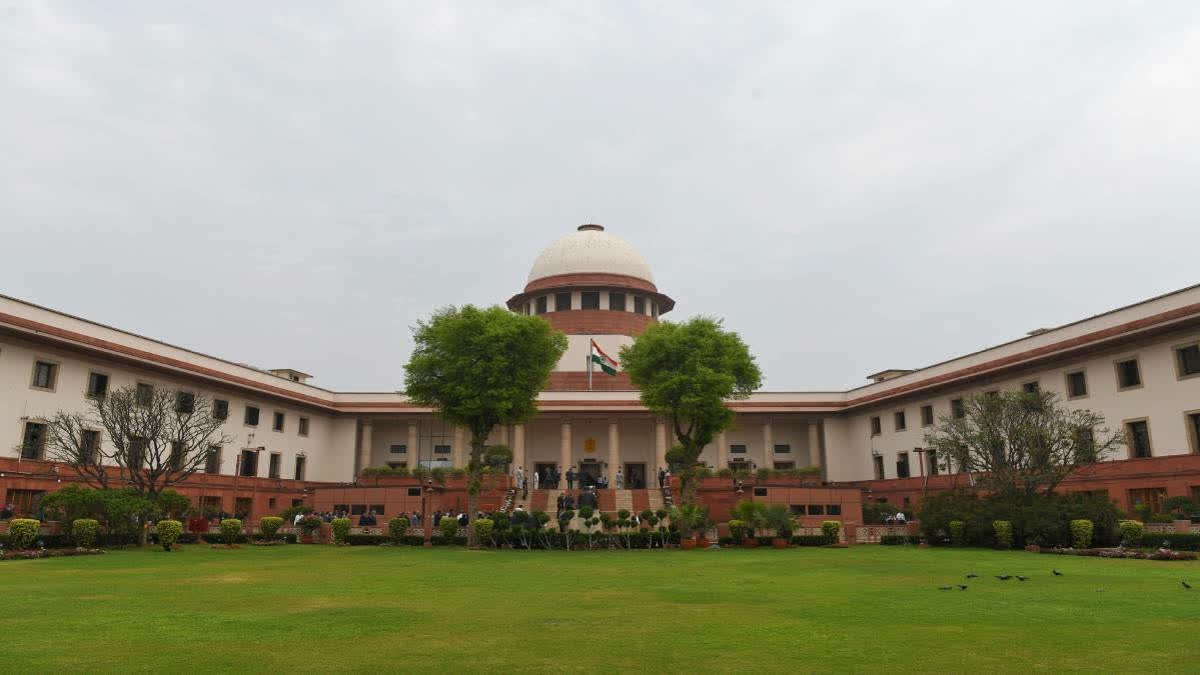New Delhi:The Supreme Court has said that a man cannot refuse maintenance to his estranged wife, who has decided to stay away from his society, despite the man having a decree of restitution of conjugal right and stressed that this decree cannot be held against her.
A bench led by Chief Justice of India Sanjiv Khanna and Sanjay Kumar delivered the judgment on January 10. The apex court considered a question, will a husband, who secures a decree for restitution of conjugal rights, stand absolved of paying maintenance to his wife by virtue of Section 125(4) of the Code of Criminal Procedure, 1973, if his wife refuses to abide by the said decree and return to the matrimonial home?
The bench said this intriguing question was answered in the affirmative by a judge of the Jharkhand High Court, in August 2023, and aggrieved, by it the wife has moved the apex court. A court, by issuing a decree of restitution of conjugal rights, orders a woman to return to her husband.
Citing Babita vs Munnal Lal, a 2022 ruling by the Delhi High Court, the bench observed that the mere presence of a decree for restitution of conjugal rights was, therefore, held insufficient to disentitle a wife from claiming maintenance, if the conduct of the husband is such that she is unable to obey such a decree or if the husband creates such circumstances that she cannot stay with him.
"It was noted that even a divorced wife is entitled to maintenance under Section 125 Cr.P.C. and it would be improper and unfair to deny maintenance to a wife merely because she refused to cohabit with the husband, despite having sufficient grounds therefor," observed the apex court.
The bench said the preponderance of judicial thought weighs in favour of upholding the wife’s right to maintenance under Section 125 Cr.P.C (order for maintenance of wives, children, and parents’).
"The mere passing of a decree for restitution of conjugal rights at the husband’s behest and non-compliance therewith by the wife would not, by itself, be sufficient to attract the disqualification under Section 125(4) Cr.P.C," said Justice Kumar, who authored the judgment on behalf of the bench.
The apex court made it clear that there cannot be a hard and fast rule denying maintenance under Section 125 to a wife who declines to return to her husband and it must invariably depend on the distinctive facts and circumstances obtained in each particular case.
"In any event, a decree for restitution of conjugal rights secured by a husband coupled with non-compliance therewith by the wife would not be determinative straightaway either of her right to maintenance or the applicability of the disqualification under Section 125(4) Cr.P.C," said the bench.
It was argued that the findings in the judgment for restitution of conjugal rights by the family court, being a civil court, would be binding on the court seized of the petition under Section 125 Cr.P.C, as they are to be treated as criminal proceedings. The apex court said this specious argument needs mention only to be rejected outright.
"In Rajnesh vs. Neha and another (2021), this court emphasided that maintenance laws were enacted as a measure of social justice to provide recourse to dependent wives and children for their financial support, so as to prevent them from falling into destitution and vagrancy," noted the apex court.
Citing an earlier apex court ruling, the bench said it was held that Section 125 Cr.P.C. is a measure of social justice, especially enacted to protect women and children, falling within the constitutional sweep of Article 15(3) reinforced by Article 39 of the Constitution. "Thus, the objective of the provision, then and now, is to alleviate the financial plight of destitute wives, children and now, parents, who are left to fend for themselves," it said.
In the present case, the apex court set aside a 2023 judgment delivered by the Jharkhand High Court denying the woman maintenance, as she did not join her husband despite the man securing a decree of restitution of conjugal rights.
The apex court said husband’s conduct in completely ignoring his wife, after she suffered the miscarriage of their child would have been the proverbial last straw adding to her suffering due to the ill-treatment in her matrimonial home. “She, therefore, had just cause to not return to her matrimonial home, despite the restitution decree”, noted the bench.
The apex court directed the husband to pay the woman maintenance starting the day she filed the application in August 2019. “Arrears of the maintenance shall be paid by husband in three equal instalments, i.e., the first instalment by 30.04.2025, the second instalment by 31.08.2025 and the third and final instalment by 31.12.2025”, said the apex court.
